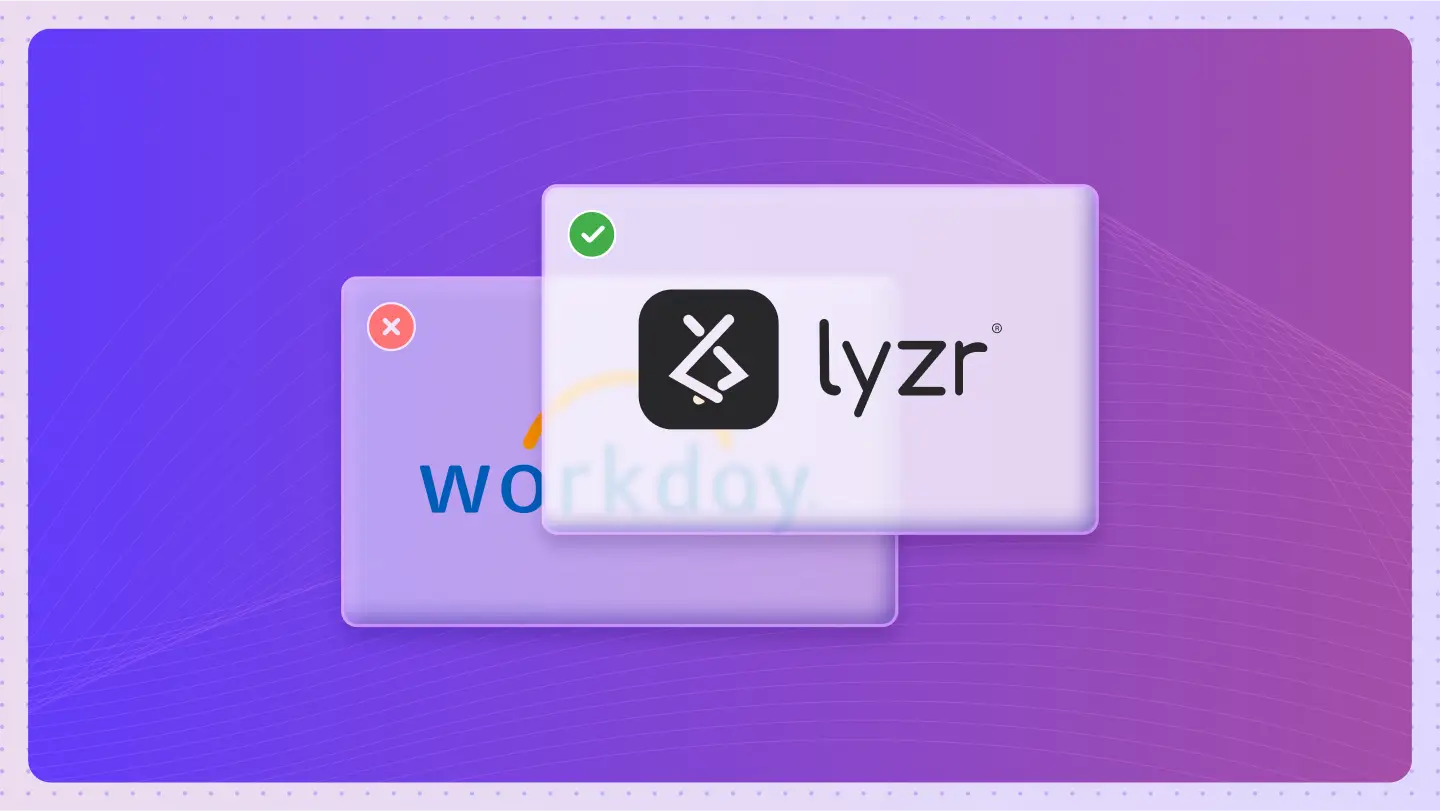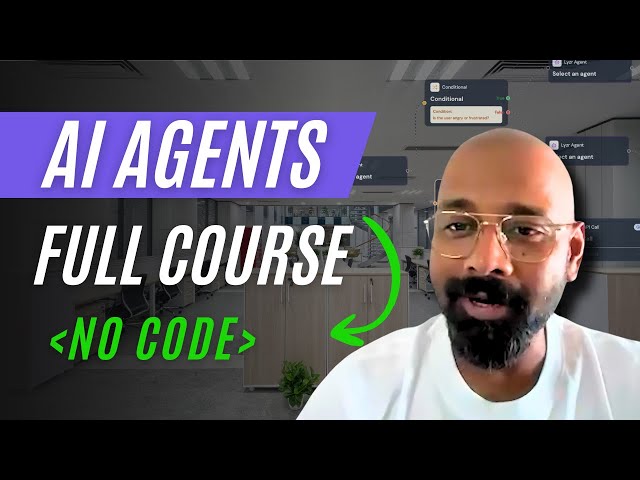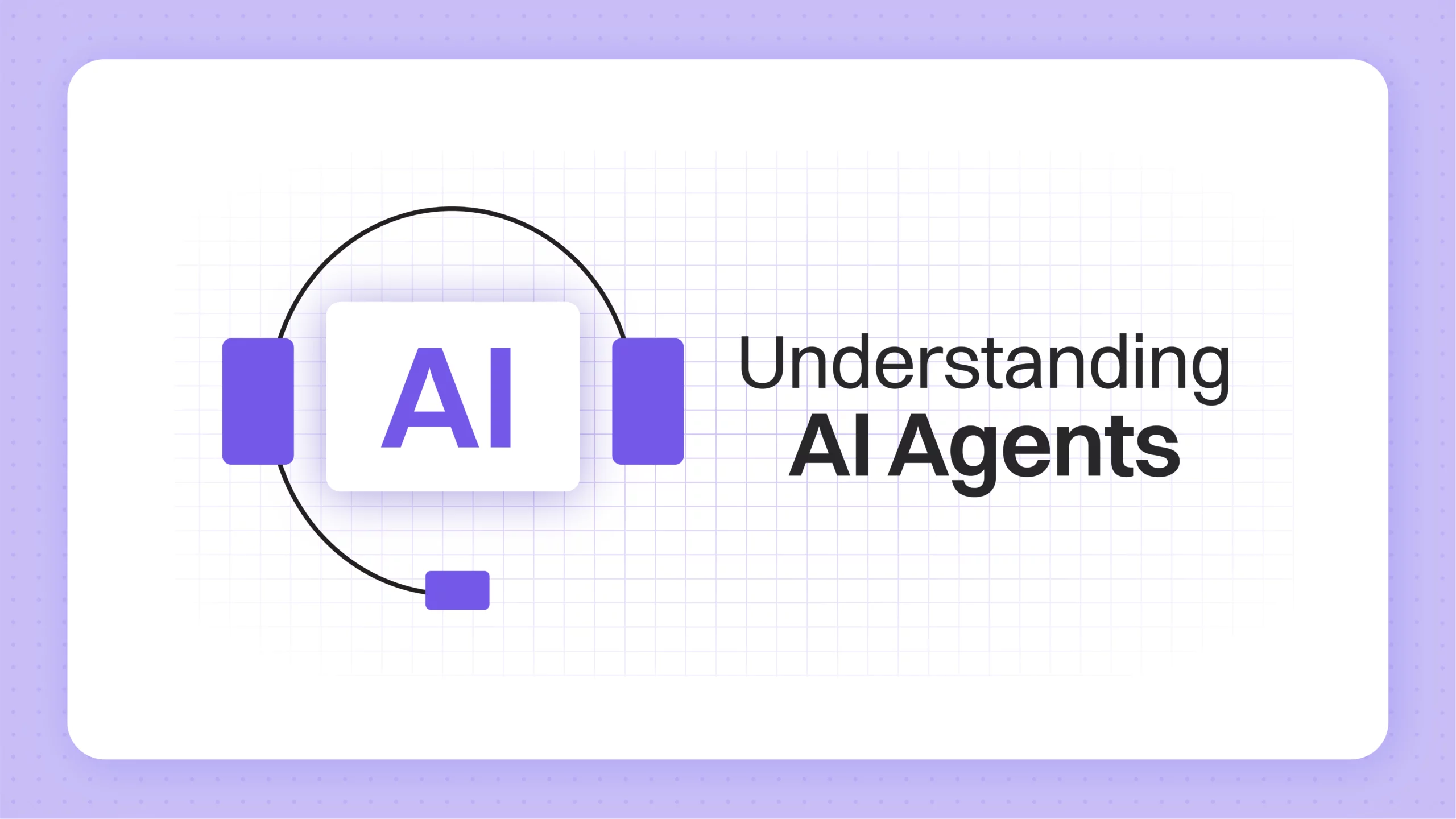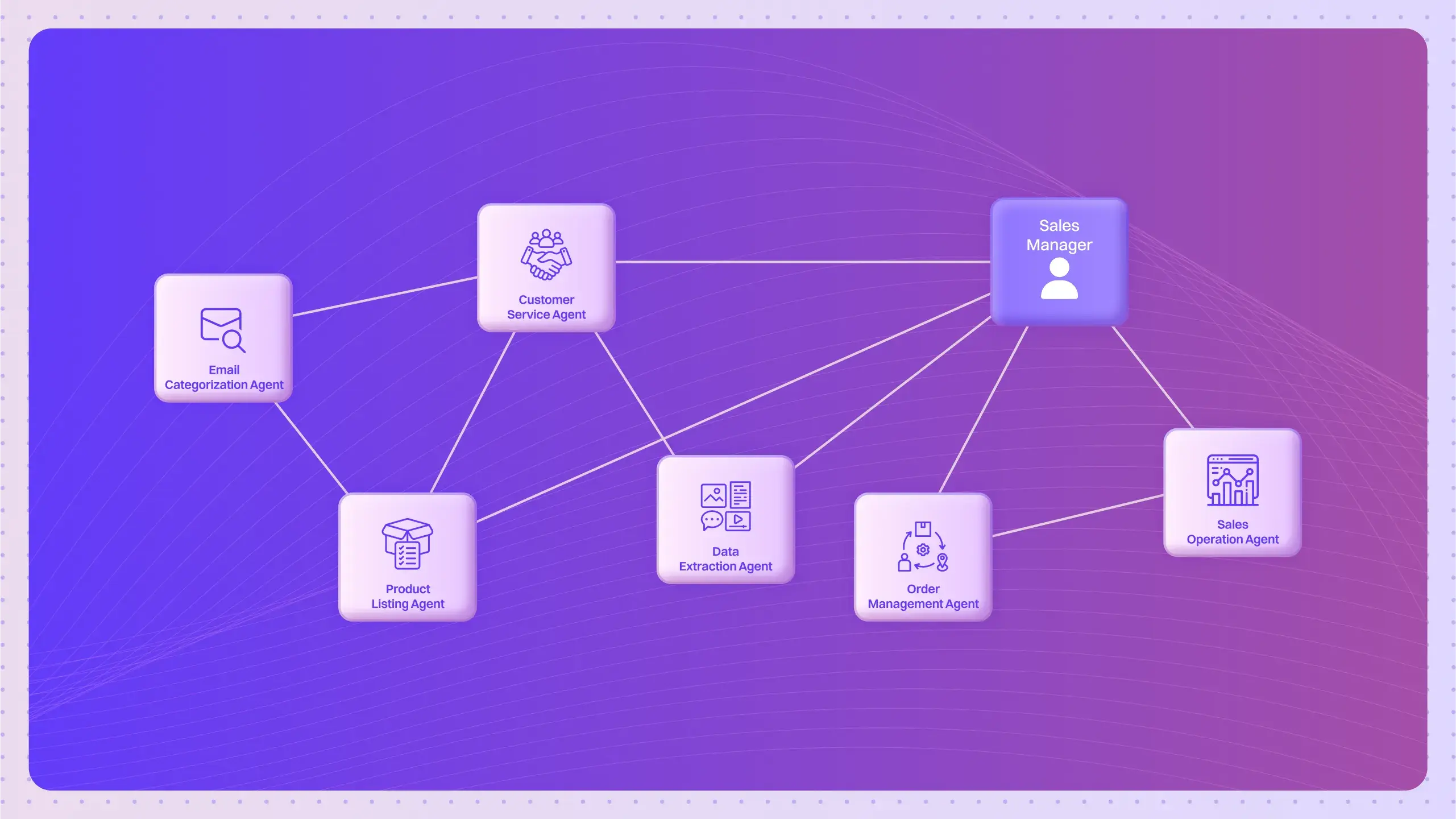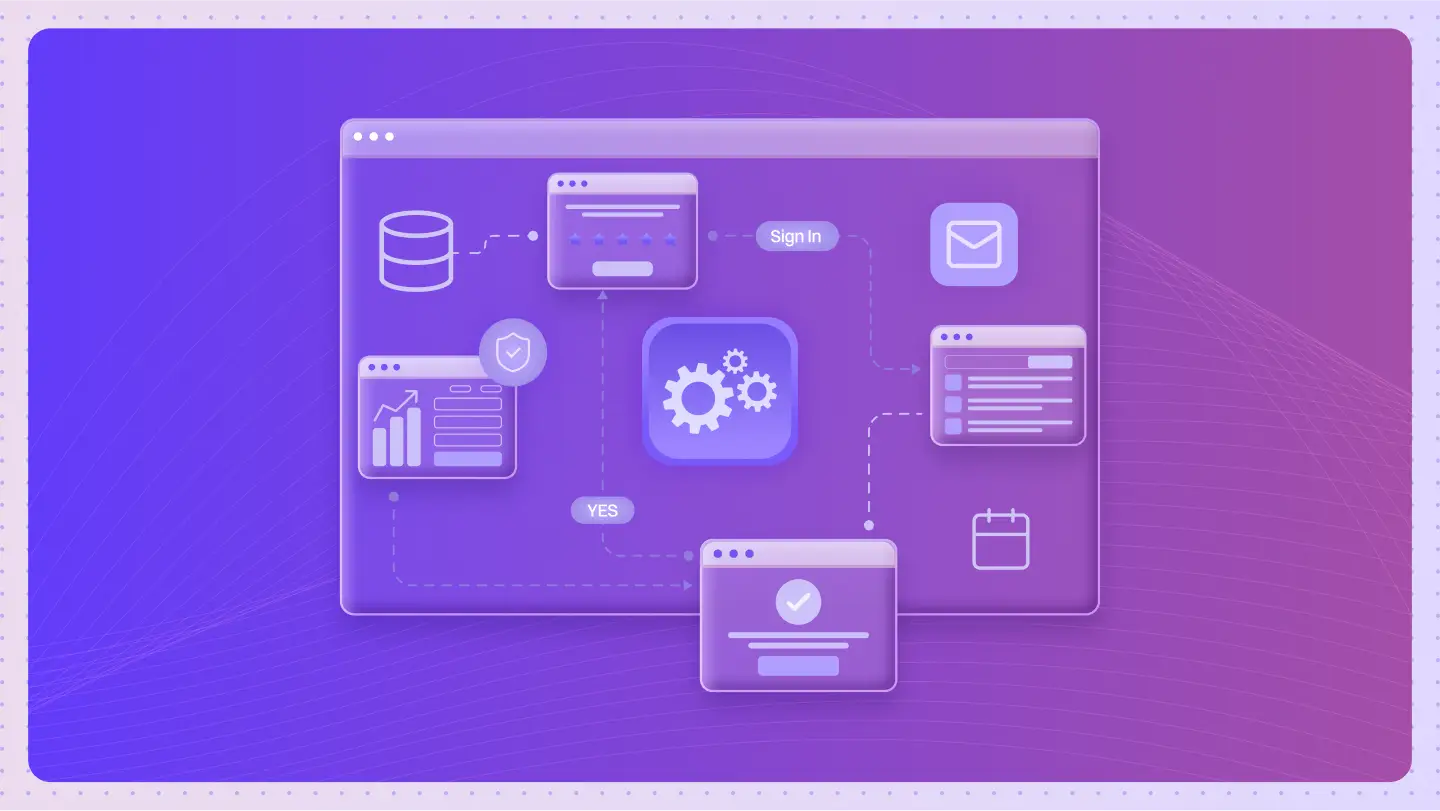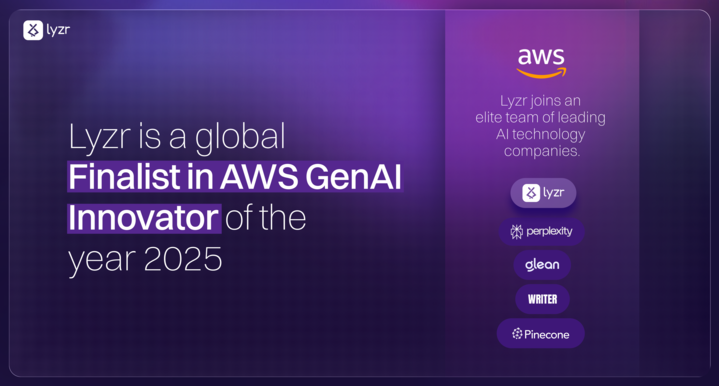Table of Contents
ToggleBusinesses are designed to run like well-oiled machines – each department facilitating the functioning of another so they can all contribute to the organizational goals effectively.
Often, the cogs that make up the machine can falter – human error, fatigue, lack of resources are only a few of the reasons why businesses aren’t always able to function at optimal capacity.
But imagine a world where routine tasks are automated to perfection by artificial intelligence, so humans can focus on strategic and creative endeavors – tasks where they truly shine.
And where intelligent AI agent counterparts handle complex tasks and make real-time decisions, propelling your productivity to new heights.
Artificial intelligence (AI) has transformed how businesses operate, and at the heart of this transformation are intelligent agents. An intelligent agent in artificial intelligence is an autonomous program that interacts with environments to meet specific goals. These agents perceive their environment, make decisions, and adapt from previous experiences to enhance their performance over time.
Lyzr, a leading AI solutions provider, is at the forefront of this revolution, offering advanced AI agents that automate and enhance business processes.
This comprehensive guide will explore the power of AI agents and how they can benefit businesses, with a focus on our innovative solutions.
What is the Difference Between an Agent and an AI System?
While the terms “agent” and “AI system” are often used interchangeably, they represent different aspects of artificial intelligence. An AI system is a broad term that encompasses any software or hardware setup designed to perform tasks that typically require human intelligence. This can include anything from machine learning algorithms to complex neural networks and data analytics platforms.
For example, an AI system might be used to analyze large datasets to predict market trends or identify patterns in customer behavior.
On the other hand, an agent, specifically an AI agent, refers to a more specialized component within an AI system that acts autonomously to achieve specific goals. An AI agent is software that performs tasks for users, automates processes, and interacts intelligently with their surroundings.

AI agents, such as Lyzr’s Jazon and Skott, are intelligent agents designed to perceive their environment, make decisions, and take actions independently. Unlike general AI systems, agents operate continuously and interact with their environment in real-time.
For instance, Jazon can autonomously manage sales outreach, following up with leads and scheduling meetings, while Skott can generate and optimize marketing content based on user interactions and data insights.
Essentially, while all agents are part of AI systems, not all AI systems function as autonomous intelligent agents.
Understanding AI Agents in Detail
A software agent in AI is a program designed to assist users or act on their behalf by performing tasks autonomously, perceiving its environment, making decisions, and taking actions to achieve specific goals.
A fundamental aspect of AI agents is the agent function, which defines how collected data is translated into actions. The agent function embodies the agent’s intelligence by allowing it to reason and select actions based on environmental inputs.
Unlike traditional software, AI agents operate based on a combination of real-time data and advanced algorithms, allowing them to adapt and respond to dynamic conditions.
These intelligent agents can vary from simple reflex agents, which react to immediate inputs, to more sophisticated models like utility-based and goal-based agents that consider multiple factors and potential outcomes.
Lyzr’s AI agents, such as Jazon and Skott, exemplify cutting-edge technology, integrating advanced machine learning techniques to continuously improve their performance and efficiency. By leveraging AI agents, businesses can automate complex processes, enhance decision-making, and achieve greater operational agility.

Classification of AI Agents
AI agents come in various forms, each designed to handle different levels of complexity and decision-making tasks.
Simple Reflex Agents
- Operate on basic if-then rules.
- React to specific conditions without considering past experiences.
- Example: Basic thermostat that turns on heating if the temperature drops below a certain point.
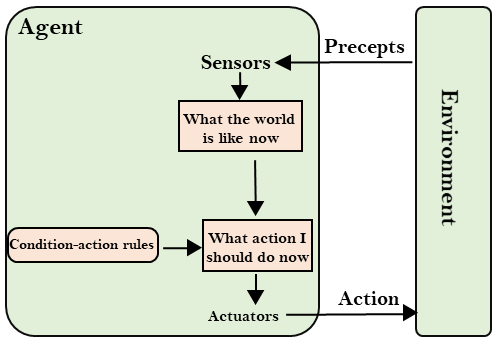
Model-Based Reflex Agents
- Maintain an internal model of the environment.
- Learn from previous interactions and predict future states.
- Example: Smart home systems that adjust lighting and temperature based on user patterns.
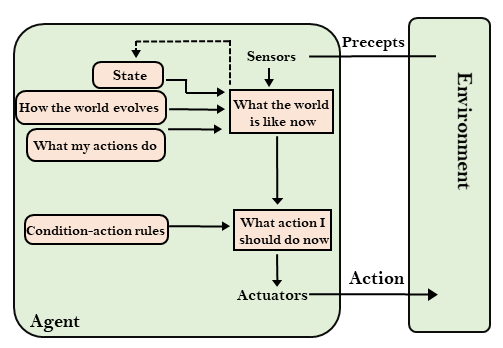
Goal-Based Agents
- Driven by specific objectives.
- Make decisions that bring them closer to achieving these goals.
- Example: Autonomous delivery robots that navigate to a delivery location.
- Rational agents: Act to maximize expected values of performance measures based on their experiences.
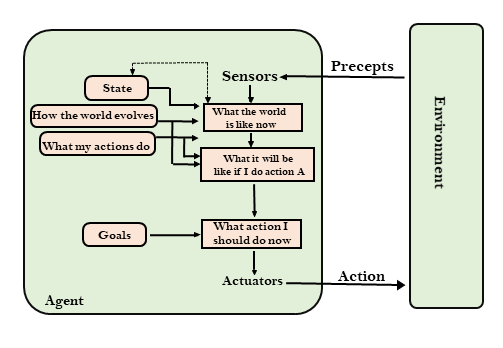
Utility-Based Agents
- Evaluate different possible actions based on a utility function.
- Measure the desirability of outcomes to make optimal decisions.
- Example: Financial trading systems that choose trades based on risk and return analysis.
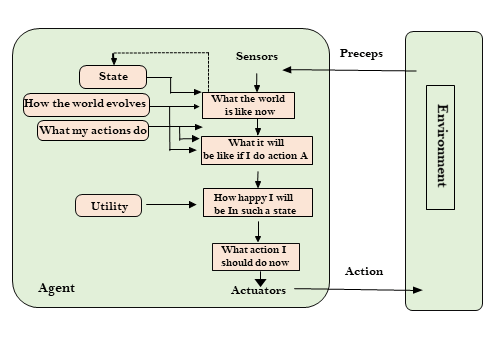
Learning Agents
- Continuously adapt and improve by learning from their experiences.
- Use techniques like machine learning and reinforcement learning.
- Example: Customer support bots that improve responses based on user interactions.
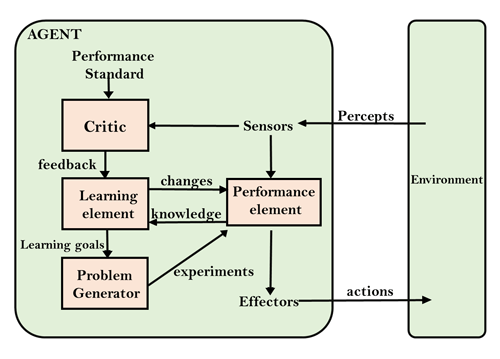
Autonomous Agents
- Make decisions without human intervention.
- Adapt to changing environments.
- Multiple agents within multi-agent systems (MAS) engage in interaction and collaboration to achieve shared or individual objectives.
- Example: Self-driving cars that navigate complex traffic conditions.
Lyzr Brings You Hybrid Autonomous Agents: Combining Multiple AI Agents
Hybrid autonomous agents combine the strengths of various types of AI agents to deliver superior performance and adaptability. These agents can use internal models not only to interact with their surroundings but also to describe and predict the behaviors of other agents within the environment.
Lyzr’s AI agents, such as Skott and Jazon, are prime examples of hybrid autonomous agents.
Skott integrates elements of goal-based, utility-based, learning and autonomous agents to provide comprehensive marketing automation. It can tailor campaigns, analyze results, and optimize strategies autonomously.
Similarly, Jazon merges model-based reflex capabilities with advanced learning algorithms to manage sales outreach, follow-ups, and lead generation seamlessly. By leveraging multiple AI techniques, Lyzr’s hybrid autonomous agents ensure high efficiency, personalization, and adaptability in dynamic business environments.
What are the Components of an AI Agent at Lyzr?
1. Perception System
The perception system is responsible for gathering data from the agent’s environment. This component uses various sensors and data sources to collect relevant information, which is then processed and interpreted.
2. Decision-Making System
The decision-making system, often powered by advanced algorithms and AI models, analyzes the data received from the perception system. It evaluates different actions based on predefined rules, learning from past interactions and making predictions to choose the best course of action. A key aspect of this system is the utility based agent, which evaluates potential actions based on expected utility. These agents use utility functions to determine how desirable different states are, allowing them to make informed decisions that maximize their performance in various environments.
3. Action System
Once a decision is made, the action system executes the chosen actions. This system uses actuators or other output mechanisms to interact with the environment, ensuring the agent’s decisions are implemented effectively.
4. Learning Element
The learning element is crucial for the continuous improvement of the AI agent. It enables the agent to adapt by learning from new experiences, refining its decision-making processes, and optimizing its actions over time.
5. Knowledge Base
The knowledge base stores all relevant information, rules, and data that the AI agent needs to function. This component allows the agent to refer to historical data, understand patterns, and apply knowledge to new situations.
6. Communication System
In multi-agent systems, the communication system facilitates interaction between different agents. This system ensures seamless collaboration, information sharing, and coordination, enhancing the overall efficiency and effectiveness of the agents.
How do AI Agents Work?

AI agents, particularly those developed by Lyzr, are designed to replicate and enhance human decision-making processes. By leveraging advanced technologies and algorithms, Lyzr’s AI agents transform business operations. Here’s a detailed look at how Lyzr’s AI agents, like Jazon and Skott, work:
1. Perception and Data Collection
Lyzr’s AI agents start by perceiving their environment through various sensors and data sources. These can include online behavior patterns, search patterns, online data streams, and enterprise databases. For instance, Skott collects data from market trends and customer interactions, providing a comprehensive view of the business landscape. This data is crucial for understanding the context and making informed decisions.
2. Data Processing and Analysis
Once the data is collected, Lyzr’s AI agents process and analyze it. Techniques such as natural language processing (NLP), image recognition, and statistical analysis are employed to transform raw data into actionable insights. For example, Jazon uses NLP to understand customer queries and interactions, ensuring precise and personalized responses. The processed data is then fed into the decision-making system.
3. Decision-Making
The core of Lyzr’s AI agents lies in their decision-making capabilities. Advanced algorithms, machine learning models, and predefined rules power the decision-making system. The agents evaluate possible actions by considering the current state of the environment and leveraging past experiences.
For instance, Skott might analyze market data to determine the best marketing strategy, while Jazon could decide the optimal approach for customer engagement. The goal is to choose actions that maximize efficiency and effectiveness. What are AI agents? They are autonomous computer programs capable of making decisions and performing tasks independently, representing a significant advancement in artificial intelligence.
4. Action Execution
After making a decision, Lyzr’s AI agents execute the chosen actions using actuators. These can range from sending automated emails to adjusting supply chain operations. For example, Jazon can autonomously send follow-up emails to potential clients, while Skott can deploy targeted marketing campaigns. The actions are continuously monitored and adjusted based on real-time feedback.
5. Learning and Adaptation
A defining feature of Lyzr’s AI agents is their ability to learn and adapt. Using machine learning and reinforcement learning techniques, these agents continuously improve their performance. They learn from past interactions, feedback, and new data to refine their decision-making processes. This ensures that Lyzr’s AI agents become more efficient and effective over time, adapting to changing business environments and objectives.

Real Life Examples of Lyzr’s AI Agents
Lyzr’s AI agents, Skott and Jazon, are at the forefront of transforming business operations across various sectors. These intelligent agents are designed to automate tasks, provide real-time insights, and enhance decision-making processes. Here’s how Skott and Jazon are being utilized in different industries:
1. Marketing and Content Creation with Skott
Skott is a powerful AI agent tailored for marketing and content creation. By leveraging advanced algorithms and natural language processing, Skott can generate high-quality, SEO-optimized content in a fraction of the time it would take a human. Here are some key applications:
- Content Generation: Skott can create blog posts, social media updates, and marketing emails that resonate with your target audience. Its ability to understand and mimic human writing styles ensures that the content is engaging and relevant.
- SEO Optimization: Skott analyzes keyword trends and optimizes content to improve search engine rankings, driving organic traffic to your website.
Campaign Management: Skott can manage marketing campaigns by analyzing performance data and providing insights on how to improve engagement and conversion rates.
2. Sales and Customer Interaction with Jazon
Jazon is an AI agent designed to revolutionize sales processes and customer interactions. It automates repetitive tasks, provides personalized communication, and enhances the overall customer experience. Key applications include:
- Lead Generation and Qualification: Jazon can identify potential leads by analyzing customer data and behavior. It engages with prospects through personalized messages, ensuring a higher conversion rate.
- Automated Follow-Ups: Jazon handles follow-up communications, scheduling meetings, and sending reminders, freeing up sales teams to focus on closing deals.
- Customer Support: Jazon provides 24/7 customer support, answering queries, resolving issues, and guiding customers through the sales funnel. Its ability to learn from past interactions ensures continuous improvement in service quality.
3. Competitor Analysis and Insights with Kathy
Kathy can process large volumes of data, identify patterns, and generate actionable insights. Applications include:
- Market Analysis: Kathy can analyze market trends, competitor strategies, and customer preferences to help businesses stay ahead of the curve.
- Performance Metrics: By tracking key performance indicators (KPIs), Kathy provides insights into what’s working and what needs improvement, enabling data-driven decision-making.
4. Customer Relationship Management with Jeff
Jeff excels in managing customer relationships, ensuring that every interaction is personalized and meaningful. Applications include:
- Personalized Outreach: Jeff tailors its communication based on customer data, providing a personalized experience that strengthens customer relationships.
- Feedback Collection: Jeff can gather customer feedback and analyze it to identify areas for improvement, helping businesses enhance their products and services.
Retention Strategies: By understanding customer behavior and preferences, Jeff helps businesses develop effective retention strategies to keep customers engaged and loyal.
How Lyzr Creates and Improves AI Agents
Lyzr is dedicated to pushing the boundaries of AI technology, continually creating and refining our AI agents to ensure they meet the highest standards of efficiency, adaptability, and intelligence. Here’s a look at how we create and improves its AI agents like Skott and Jazon:
1. Research and Development Lyzr’s journey to developing top-tier AI agents begins with intensive research and development. This involves:
- Cutting-Edge Technology: Lyzr leverages the latest advancements in machine learning, deep learning, and natural language processing to create AI agents that can understand, learn, and interact with their environment effectively.
Innovative Algorithms: By developing proprietary algorithms, Lyzr ensures that its AI agents can process complex data sets, identify patterns, and make intelligent decisions in real-time.

2. Data-Driven Approach Data is at the core of Lyzr’s AI agent development. The company employs a data-driven approach to ensure that its agents are highly accurate and reliable.
- Extensive Data Collection: Lyzr collects vast amounts of data from various sources to train its AI agents. This data includes customer interactions, market trends, and performance metrics.
Quality Data: Ensuring the quality of data is paramount. Lyzr uses sophisticated techniques to clean, preprocess, and validate data, ensuring that its AI agents are trained on accurate and relevant information.
3. Machine Learning and Continuous Improvement Lyzr’s AI agents are built using advanced machine learning techniques that enable them to learn from their experiences and improve over time.
- Supervised and Unsupervised Learning: Lyzr employs both supervised and unsupervised learning methods to train its AI agents. This allows the agents to learn from labeled data and identify patterns in unlabeled data.
- Reinforcement Learning: By using reinforcement learning, Lyzr’s AI agents can make decisions that maximize their performance over time. They learn from the outcomes of their actions and adjust their strategies accordingly.
4. Human-in-the-Loop To enhance the performance and reliability of its AI agents, Lyzr integrates human expertise into the development process.
- Expert Feedback: Lyzr collaborates with industry experts to provide feedback on the AI agents’ performance. This feedback is used to fine-tune the agents and ensure they meet the specific needs of different business sectors.
- Iterative Improvement: By continuously incorporating human insights, Lyzr’s AI agents undergo iterative improvement, becoming more accurate and effective with each iteration.
5. Rigorous Testing and Validation Before deployment, Lyzr’s AI agents undergo rigorous testing and validation to ensure they perform optimally in real-world scenarios.
- Simulated Environments: Lyzr tests its AI agents in simulated environments that mimic real-world conditions. This helps identify potential issues and refine the agents’ decision-making processes.
- Performance Metrics: Lyzr uses comprehensive performance metrics to evaluate the effectiveness of its AI agents. This includes accuracy, response time, and user satisfaction.
6. Deployment and Monitoring Once deployed, Lyzr continues to monitor its AI agents to ensure they deliver consistent performance and adapt to changing environments.
- Real-Time Monitoring: Lyzr employs real-time monitoring tools to track the performance of its AI agents. This allows for immediate identification and resolution of any issues.
- Continuous Updates: Lyzr regularly updates its AI agents with new data and improvements. This ensures that the agents remain up-to-date and continue to provide optimal performance.
By following these rigorous development and improvement processes, we create AI agents like Skott and Jazon that are not only highly effective but also continuously evolve to meet the dynamic needs of businesses. This commitment to excellence ensures that Lyzr’s AI solutions remain at the forefront of innovation, driving growth and success for their clients.

Future of Intelligent AI Agents from Lyzr
The future of intelligent AI agents at Lyzr is incredibly promising, as the company continues to innovate and push the boundaries of what AI technology can achieve. Here’s a glimpse into what the future holds for Lyzr’s AI agents:
1. Advanced Capabilities and Enhanced Performance Lyzr is committed to continuously enhancing the capabilities of its AI agents. Future developments will focus on:
- Advanced Natural Language Processing (NLP): Lyzr aims to further refine its NLP algorithms, enabling AI agents like Skott and Jazon to understand and respond to human language with even greater accuracy and nuance.
- Contextual Understanding: Future AI agents will have improved contextual understanding, allowing them to provide more relevant and personalized interactions based on the specific needs and preferences of users.
2. Greater Autonomy and Adaptability As AI technology evolves, Lyzr’s AI agents will become even more autonomous and adaptable:
- Self-Learning: Future AI agents will be capable of self-learning, continuously improving their performance without requiring constant human intervention. This will be achieved through advanced reinforcement learning techniques and real-time data analysis.
- Dynamic Adaptation: Lyzr’s AI agents will be able to adapt to changing environments and user requirements dynamically. This will make them more resilient and effective in handling a wide range of tasks and scenarios.
3. Enhanced Integration and Collaboration Lyzr is working towards creating a more integrated and collaborative AI ecosystem:
- Seamless Integration: Future AI agents will integrate seamlessly with a broader range of business systems and platforms, providing a unified and cohesive AI solution. This will enhance operational efficiency and data flow across various business functions.
- Collaborative Multi-Agent Systems: Lyzr is developing multi-agent systems where multiple AI agents can collaborate and communicate effectively. This will enable complex tasks to be managed more efficiently and with greater coordination.
4. Focus on Security and Ethical AI Lyzr places a high priority on security and ethical considerations in AI development:
- Robust Security Measures: Future AI agents will come with enhanced security features to protect against cyber threats and data breaches. This will ensure the safety and privacy of sensitive business information.
- Ethical AI Practices: Lyzr is committed to developing AI agents that operate ethically and transparently. Future agents will include mechanisms to ensure fairness, accountability, and transparency in their decision-making processes.
5. Data Privacy and Control Lyzr understands the importance of data privacy in today’s digital world:
- Privacy-First Approach: Future AI agents will be designed with a privacy-first approach, ensuring that all data processed is handled with the utmost care and confidentiality.
- Data Control: Lyzr will empower businesses with greater control over their data, offering solutions that allow for local deployment and strict compliance with data privacy regulations like GDPR and SOC2.
6. Industry-Specific Solutions Lyzr will continue to tailor its AI solutions to meet the specific needs of various industries:
- Customized AI Agents: Future developments will focus on creating customized AI agents designed to address the unique challenges and requirements of different industries, such as finance, healthcare, retail, and more.
- Vertical-Specific Enhancements: Lyzr’s AI agents will incorporate industry-specific enhancements, enabling businesses to leverage AI technology for specialized applications and achieve better outcomes.
7. User-Friendly Interfaces and Accessibility Lyzr is dedicated to making AI technology accessible and user-friendly:
- Intuitive Interfaces: Future AI agents will feature more intuitive and user-friendly interfaces, making it easier for businesses to interact with and manage their AI solutions.
Accessible AI: Lyzr aims to democratize AI technology, ensuring that businesses of all sizes can benefit from advanced AI capabilities without requiring extensive technical expertise.
Conclusion
The future of intelligent AI agents from Lyzr is bright, with a focus on advanced capabilities, greater autonomy, enhanced integration, robust security, industry-specific solutions, user-friendly interfaces, and a strong emphasis on data privacy. As Lyzr continues to innovate and develop cutting-edge AI technology, businesses can look forward to leveraging these intelligent agents to drive growth, efficiency, and success in an increasingly competitive landscape. Stay ahead of the curve by exploring Lyzr’s AI solutions today and unlock the full potential of intelligent AI agents for your business.
Images:
https://www.javatpoint.com/types-of-ai-agents
Midjourney.com
Book A Demo: Click Here
Join our Slack: Click Here
Link to our GitHub: Click Here



